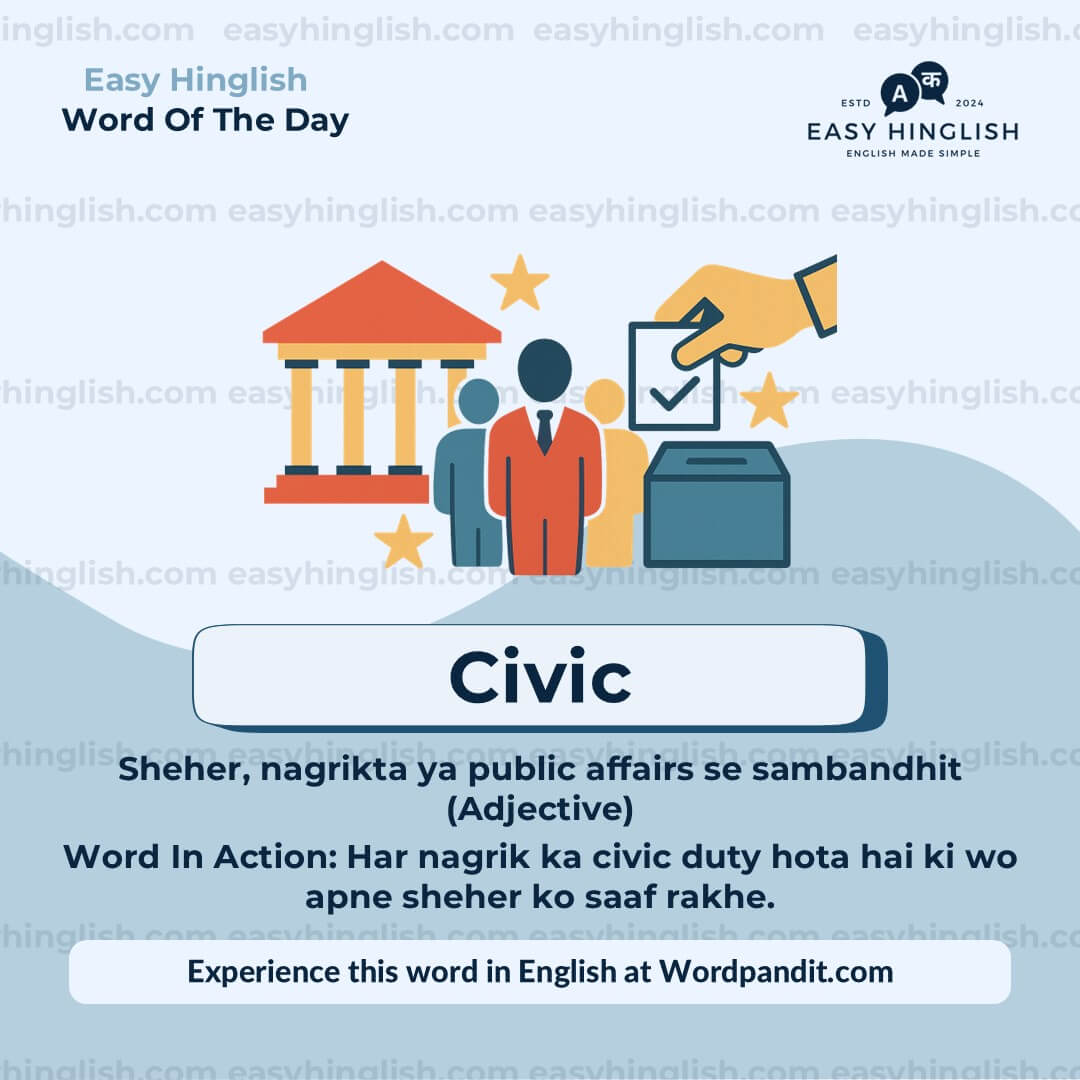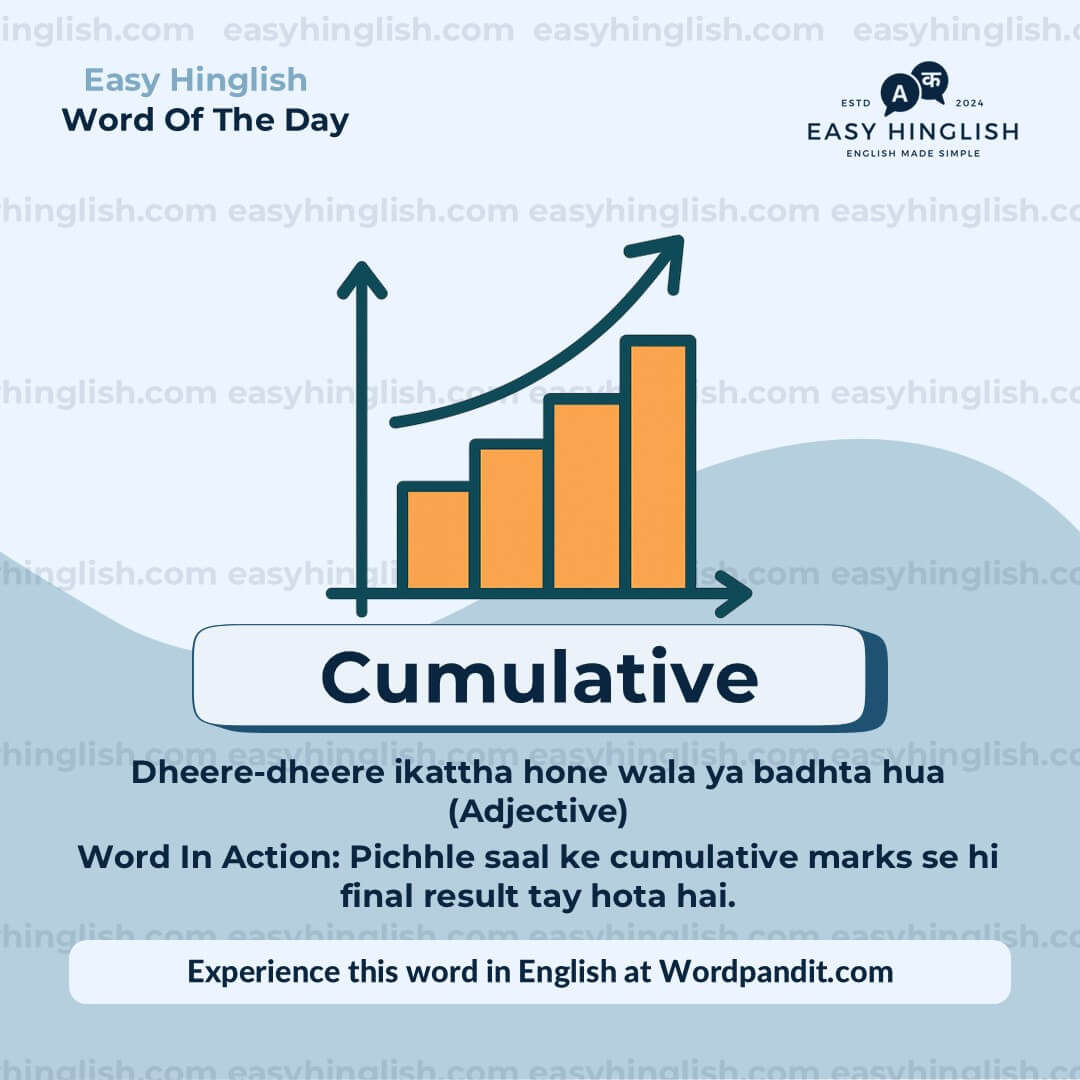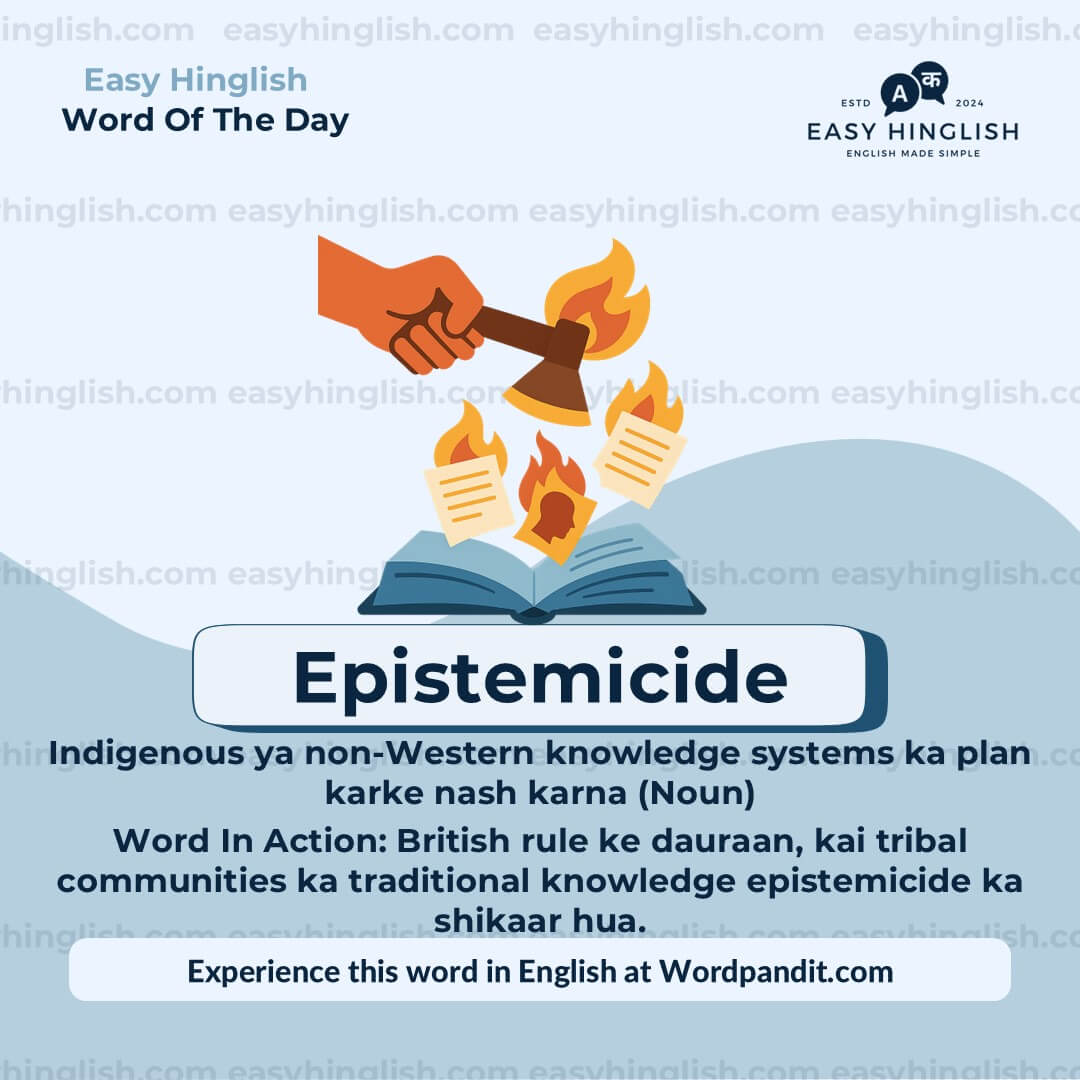Daily Vocabulary International Newspapers aur Publications se Seekho
Wordpandit ke Global Vocabulary Hub ke Saath Apni Vocabulary Expand Karo
Wordpandit par, hum aapko ek truly global vocabulary develop karne me madad karte hain, jo duniya ke sabse respected international publications se li gayi hoti hai. Yeh section aapko naye words se introduce karne ke liye design kiya gaya hai jo global conversations aur trends ko define karte hain.
Global Sources ka Power
Aapko globally sochne aur communicate karne me madad dene ke liye, hum vocabulary curate karte hain world ke top international sources se, jaise:
- The New York Times
- The Washington Post
- BBC
- The Guardian
- The Economist
- Scientific American
- Psychology Today
- Aur bhi bahut saare...
Globally Socho, Competitively Seekho
Hamare daily updates se aap international publications ke naye words seekhoge jo global news aur developments se jude hote hain. Isse aapki vocabulary current bhi rahegi aur globally relevant bhi.
Apni Global Soch Ko Expand Karo
Agar aap international exams ki tayari kar rahe ho, global business communication me excel karna chahte ho, ya sirf apni language skills improve karna chahte ho, toh Wordpandit aapko global level pe grow karne ke liye best resources provide karta hai.
Smart Learning, Global Reach
Hamari learning methodology me global examples, memory aids, aur interactive activities shamil hain, jo naye words ko effectively yaad karne aur real-world me use karne me madad karti hain.
Aaj Hi Apni Global Vocabulary Journey Shuru Karo!
Wordpandit Kyun Choose Karein?
Practical Learning: Aise words seekho jo real-world reading aur communication me aapko sach me kaam aayenge, taaki aapki comprehension aur bolne ki skills improve ho.
Diverse Content: Current affairs se lekar scientific breakthroughs tak, hamare different sources aapko multiple domains ki vocabulary seekhne ka moka dete hain.
Effortless Integration: Wordpandit ko apni daily routine ka part banao. Sirf kuch minute har din dene se aapki vocabulary time ke saath kaafi improve ho sakti hai.
Vocabulary Mastery Tak Ka Aapka Safar
- Regularly hamare Daily Vocabulary section ko visit karo
- Naye words explore karo aur unka context me use samjho
- In words ko apni writing aur bolne ki practice me use karne ki koshish karo
- Jaise-jaise aapke words badhte hain, apni progress ko track karo
Aaj Hi Apni Vocabulary Journey Shuru Karo!
Wordpandit ke saath vocabulary improve karna start karo. Roz thoda effort dalne se aap ek strong vocabulary develop kar sakte ho jo academic, professional, aur personal life me kaafi kaam aayegi.
Yaad rakho, ek naya shabd roz seekhna linguistic limitations ko door karne ka best tareeka hai! Wordpandit ko apni daily learning journey ka sathi banao aur vocabulary excellence ki taraf badho!
WORD-1: Sleek
Sandarbh (Context):
"The sleek high-rises in Manhattan’s Hudson Yards were built atop what was once a hub of industry. Today, argues the celebrated British American geographer David Harvey, they’re towering symbols of speculative wealth." - Aeon
Vyakhya (Explanatory Paragraph):
"Sleek" ka matlab hota hai koi cheez jo smooth, stylish aur modern ho – jaise ki ek polished car, designer building ya latest gadget. Is context mein, Manhattan ke naye high-rises ko "sleek" isliye bola gaya kyunki woh purane industrial area ke comparison mein bahut hi modern aur stylish dikhte hain. Kabhi-kabhi yeh word ek superficial ya sirf dikhawa wali polish ka bhi sanket deta hai.
Arth (Meaning): Smooth aur stylish appearance; modern aur elegant look (Adjective)
Uccharan (Pronunciation): sleek (rhymes with "peek")
Kathinai Star (Difficulty Level): ⭐⭐ Beginner to Intermediate
Utpatti (Etymology): Middle English "sliken" se aaya hai, jiska matlab hai smooth banana – shayad Scandinavian origin se.
Prashant Sir Ke Tathya (Prashant Sir's Notes):
"Sleek" un cheezon ke liye use hota hai jo dikhne mein sharp aur thoughtfully designed hoti hain – jaise ki ek Tesla car, ek premium laptop, ya koi fashion-forward outfit. Is word mein visual appeal aur material sophistication dono ka touch hota hai.
Samanarthi & Vipritarthi (Synonyms & Antonyms):
Samanarthi (Synonyms): polished, stylish, glossy, chic, smooth, refined
Vipritarthi (Antonyms): rough, dull, unpolished, coarse, shabby
Udaharan (Usage Examples):
- Uska naya smartphone kaafi sleek aur premium look deta hai.
- Gala event mein uski sleek black dress ne sabka attention khinch liya.
Sanskritik Sandarbh (Cultural Reference):
"Apple ke products ko duniya bhar mein unke sleek design ke liye jaana jaata hai – minimalist aur classy." - Design Observer
Sochiye (Think About It):
Kya kabhi koi cheez itni sleek ho sakti hai ki usme asli character ya warmth na rahe?
Chhoti Kriya (Quick Activity):
Aapke aaspaas teen aisi cheezein dekhiye jo "sleek" kehlayi ja sakti hain aur batayein kyun.
Yaad Karne Ka Tarika (Memory Tip):
"Sleek" yaad rakhne ke liye sochiye: "Slim + Chic = Sleek" – matlab koi cheez slim bhi ho aur fashionable bhi.
Vastavik Jeevan Me Upyog (Real-World Application):
"Sleek" shabd design, fashion, architecture aur tech ke field mein frequently use hota hai jab kisi modern aur appealing look ki tarif karni ho. Professional presentations ya fashion blogs mein is shabd ka use impactful hota hai.
WORD-2: Civic
Sandarbh (Context):
"He suggests that, by changing how we value space – treating land not as a commodity but as part of a shared civic life – we could begin to imagine cities that prioritise people, not profit." - Aeon
Vyakhya (Explanatory Paragraph):
"Civic" un cheezon ko refer karta hai jo kisi city ya town ki public life, administration ya community se judi hoti hain. Is sandarbh mein "civic life" ka matlab hai logon ki mil-jul kar jeene wali zindagi — jaise public parks, roads, ya city cleanliness. Ye word responsibility, cooperation aur community values ko highlight karta hai, jo ek achhi aur functional society banate hain.
Arth (Meaning): Sheher, nagrikta ya public affairs se sambandhit (Adjective)
Uccharan (Pronunciation): siv-ik
Kathinai Star (Difficulty Level): ⭐⭐ Beginner to Intermediate
Utpatti (Etymology): Latin shabd "civicus" se aaya hai, jiska matlab hai "citizen se sambandhit", jo "civis" se nikla hai (matlab citizen).
Prashant Sir Ke Tathya (Prashant Sir's Notes):
"Civic" ka matlab sirf sheher se nahi, balki humare nagrik hone ki zimmedariyon se bhi hai – jaise vote dena, safai rakhna, aur public issues mein actively part lena. Ye word humare samajik role ko represent karta hai.
Samanarthi & Vipritarthi (Synonyms & Antonyms):
Samanarthi (Synonyms): municipal, public, communal, community-related, civil
Vipritarthi (Antonyms): private, individual, personal, exclusive
Udaharan (Usage Examples):
- Mayor ne ek nayi scheme launch ki civic engagement badhane ke liye.
- Vote dena aur tax bharna jaise civic duties ek strong democracy ke liye zaroori hain.
Sanskritik Sandarbh (Cultural Reference):
"Ask not what your country can do for you – ask what you can do for your country." – John F. Kennedy ka yeh quote civic responsibility ka ek perfect udaharan hai.
Sochiye (Think About It):
Jab duniya har kisi ko self-success ki taraf push karti hai, toh hum kaise logon mein civic sense aur public responsibility jagaa sakte hain?
Chhoti Kriya (Quick Activity):
Tin aise civic responsibilities likhiye jo aap roz nibhaate hain, aur batayein woh society ke liye kaise helpful hain.
Yaad Karne Ka Tarika (Memory Tip):
"Civic" ko yaad rakhein: Civic = City + Citizen. Matlab sheher aur nagrik ke beech ka connection.
Vastavik Jeevan Me Upyog (Real-World Application):
"Civic" shabd social studies, governance, education aur city planning jaise areas mein commonly use hota hai. Iska samajhna har responsible citizen ke liye important hai.
WORD-3: Cumulative
Sandarbh (Context):
"The universalist approach is founded on a cumulative and linear path that sees philosophy as starting at the time of the pre-Socratic philosophers, developing through the ideas of Socrates, Plato, Aristotle and the rest of the ancients, on to the medieval age, and finally into the modern era that was inaugurated by René Descartes and that is currently dominated by German and French Continental philosophy." - Aeon
Vyakhya (Explanatory Paragraph):
"Cumulative" ka matlab hota hai koi cheez jo dheere-dheere badhti ja rahi ho, step by step. Jaise har naye philosopher ne purane ideas pe kuch naya add kiya, aur iss tarah se philosophy ka pura knowledge ek layered system ban gaya. Yeh word un processes ke liye bhi use hota hai jahan results time ke saath build hote hain – chahe woh learning ho, stress ho ya progress.
Arth (Meaning): Dheere-dheere ikattha hone wala ya badhta hua (Adjective)
Uccharan (Pronunciation): KYOO-myuh-luh-tiv
Kathinai Star (Difficulty Level): ⭐⭐⭐ Intermediate
Utpatti (Etymology): Latin "cumulare" se aaya hai, jiska matlab hai "heap up" ya "ekatrit karna", aur "cumulus" ka matlab hota hai "dhair" ya "heap".
Prashant Sir Ke Tathya (Prashant Sir's Notes):
"Cumulative" un results ke liye use hota hai jo ek saath nahi aate, balki time ke saath bante hain – jaise roz ka kaam, padhai, ya stress. Yeh word aapko yeh samajhne mein madad karta hai ki chhoti efforts bhi milke ek bada impact bana sakti hain.
Samanarthi & Vipritarthi (Synonyms & Antonyms):
Samanarthi (Synonyms): accumulated, growing, aggregate, collective, mounting
Vipritarthi (Antonyms): sudden, instantaneous, separate, individual, isolated
Udaharan (Usage Examples):
- Saalon ke mehnat ka cumulative effect tha ki woh CEO ban gayi.
- Nayi language seekhne ke liye cumulative practice aur exposure zaroori hota hai.
Sanskritik Sandarbh (Cultural Reference):
"Progress is cumulative — it builds upon itself." Ye idea Enlightenment era ke thinkers, jaise Steven Pinker, ke thought process ka core hai. - *Enlightenment Now* (Paraphrased)
Sochiye (Think About It):
Aapki life ke kaunse area mein cumulative efforts ne major difference create kiya – chahe positive ho ya negative?
Chhoti Kriya (Quick Activity):
Ek habit likhiye jo aap build karna chahte hain. Use 7 din tak follow kariye aur dekhiye iska cumulative impact aapke mood ya productivity pe kya padta hai.
Yaad Karne Ka Tarika (Memory Tip):
"Cumulative" yaad rakhne ke liye sochiye: jaise cups ek ke upar ek stack ho rahe ho. "Cumu-" matlab "accumulate" – dheere-dheere ikatha hona.
Vastavik Jeevan Me Upyog (Real-World Application):
"Cumulative" word finance (cumulative interest), education (cumulative exams), science (cumulative data), aur health (cumulative stress) mein kaafi use hota hai. Iska matlab samajhna long-term impact aur patterns samajhne mein help karta hai.
WORD-4: Epistemicide
Sandarbh (Context):
"In Africa, epistemicide was committed by colonisers in the name of disseminating the values of the Enlightenment and modernity." - Aeon
Vyakhya (Explanatory Paragraph):
"Epistemicide" ka matlab hota hai kisi community ya culture ke puraane knowledge systems ko jaan-boojh kar destroy kar dena. Colonial period mein jab Western powers ne apne education aur thinking impose ki, toh unhone local traditions, languages aur wisdom ko inferior samajh kar hata diya – yeh hi epistemicide hai. Yeh term hume batata hai ki kaise kai cultures ki soch aur knowledge history se mita di gayi.
Arth (Meaning): Indigenous ya non-Western knowledge systems ka plan karke nash karna (Noun)
Uccharan (Pronunciation): eh-pis-TEH-muh-side
Kathinai Star (Difficulty Level): ⭐⭐⭐⭐ Advanced
Utpatti (Etymology): Greek "episteme" (knowledge) + Latin "-cide" (killing) → matlab "knowledge ka destruction".
Prashant Sir Ke Tathya (Prashant Sir's Notes):
Yeh ek powerful aur emotional shabd hai. Jab aap colonialism, globalization ya dominant cultures ki wajah se indigenous knowledge khatam hone ki baat karte hain, tab "epistemicide" use hota hai. Bahut important word hai postcolonial studies aur education discourse mein.
Samanarthi & Vipritarthi (Synonyms & Antonyms):
Samanarthi (Synonyms): cultural erasure, intellectual colonization, knowledge suppression, ideological dominance
Vipritarthi (Antonyms): knowledge preservation, intellectual diversity, epistemic plurality, cultural continuity
Udaharan (Usage Examples):
- Colonial education system ne local ideas ko discard karke epistemicide ko badhava diya.
- Indigenous languages aur philosophies ko wapas lana epistemicide ke khilaf ek kadam hai.
Sanskritik Sandarbh (Cultural Reference):
Brazilian sociologist Boaventura de Sousa Santos ne "epistemicide" term ko popular banaya, taaki colonial aur capitalist systems ke knowledge suppression ko highlight kiya ja sake.
Sochiye (Think About It):
Kaunse knowledge ya wisdom traditions humne sirf isliye kho diye kyunki woh kisi Western language ya format mein likhe nahi gaye?
Chhoti Kriya (Quick Activity):
Kisi ek indigenous ya desi knowledge system (jaise Ayurvedic medicine, Andean agriculture, Aboriginal astronomy) ke baare mein padhiye aur likhiye kya use unique banata hai.
Yaad Karne Ka Tarika (Memory Tip):
"Episteme" = knowledge + "-cide" = killing. Sochiye "genocide", lekin logon ki jagah unki knowledge ka destruction – yaani epistemicide.
Vastavik Jeevan Me Upyog (Real-World Application):
"Epistemicide" ka use decolonization, curriculum reform, aur cultural preservation jaise topics mein hota hai. Jab hum native ya tribal stories, philosophies aur knowledge revive karte hain, tab hum epistemicide ke against kaam kar rahe hote hain.
WORD-5: Vantage
Sandarbh (Context):
"In response, the Africanists see the universalists as worshipping the Eurocentric metaphysical structure and thereby losing sight of what it means to practise philosophy from a specifically African, Ethiopian and intercultural vantage point." - Aeon
Vyakhya (Explanatory Paragraph):
"Vantage" ka matlab hota hai ek aisi position ya nazariya jahan se cheezon ko clearly aur advantage ke saath dekha ja sake — chahe woh physical jagah ho ya kisi topic par viewpoint. Is sentence mein "intercultural vantage point" ka matlab hai ek aisi soch jo African ya Ethiopian cultures ke perspective se philosophy ko samajhne ki koshish karti hai — Eurocentric nazariye se alag.
Arth (Meaning): Aisi position ya perspective jo advantage ya clarity deti ho (Noun)
Uccharan (Pronunciation): VAN-tij
Kathinai Star (Difficulty Level): ⭐⭐ Beginner to Intermediate
Utpatti (Etymology): Old French "avantage" se nikla hai, jiska matlab hai "advantage", aur Middle English mein bana "vantage".
Prashant Sir Ke Tathya (Prashant Sir's Notes):
"Vantage" ka use aap tab kar sakte ho jab aap kisi cheez ko kisi khas viewpoint se dekhte ho — jaise physical point of view (hilltop se view) ya mental perspective (cultural ya philosophical nazariya). "Vantage point" phrase essays mein kaafi useful hota hai.
Samanarthi & Vipritarthi (Synonyms & Antonyms):
Samanarthi (Synonyms): viewpoint, standpoint, perspective, position, outlook
Vipritarthi (Antonyms): blind spot, bias, narrow view, disadvantage
Udaharan (Usage Examples):
- Hilltop se uska vantage point itna accha tha ki poora valley clearly dikh raha tha.
- Us novel ne history ko ek naye vantage se bataya — indigenous voices ke zariye.
Sanskritik Sandarbh (Cultural Reference):
"Hum sab duniya ko apne-apne vantage points ke through dekhte hain." – Chimamanda Ngozi Adichie ke TED Talk *The Danger of a Single Story* se inspired line.
Sochiye (Think About It):
Aapka cultural, personal ya educational vantage point kis tarah se aapke sochne ka tareeka ya beliefs ko shape karta hai?
Chhoti Kriya (Quick Activity):
Kisi ek issue ko (jaise climate change, education, poverty) apne personal vantage se describe kariye. Fir koshish karke kisi aur ke nazariye se bhi sochiye.
Yaad Karne Ka Tarika (Memory Tip):
"Vantage" yaad rakhne ke liye sochiye: "vantage = advantageous view" — jab aap kisi high ya strategic jagah se dekh rahe ho aur zyada clearly samajh pa rahe ho.
Vastavik Jeevan Me Upyog (Real-World Application):
"Vantage" word essays, debates, journalism, aur academic writing mein frequently use hota hai jab perspectives compare karne hote hain. Ye word aapki analytical clarity aur open-mindedness dikhane mein madad karta hai.













